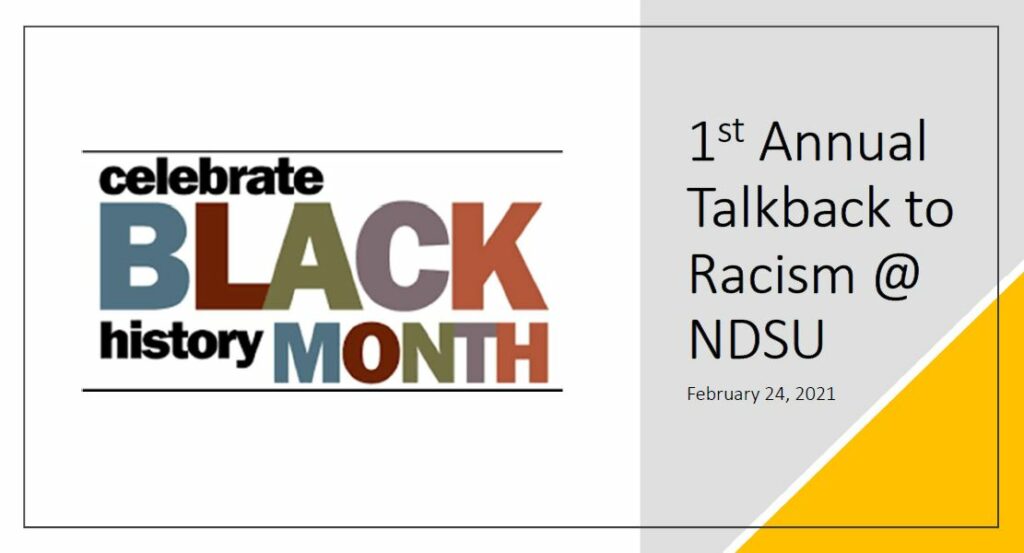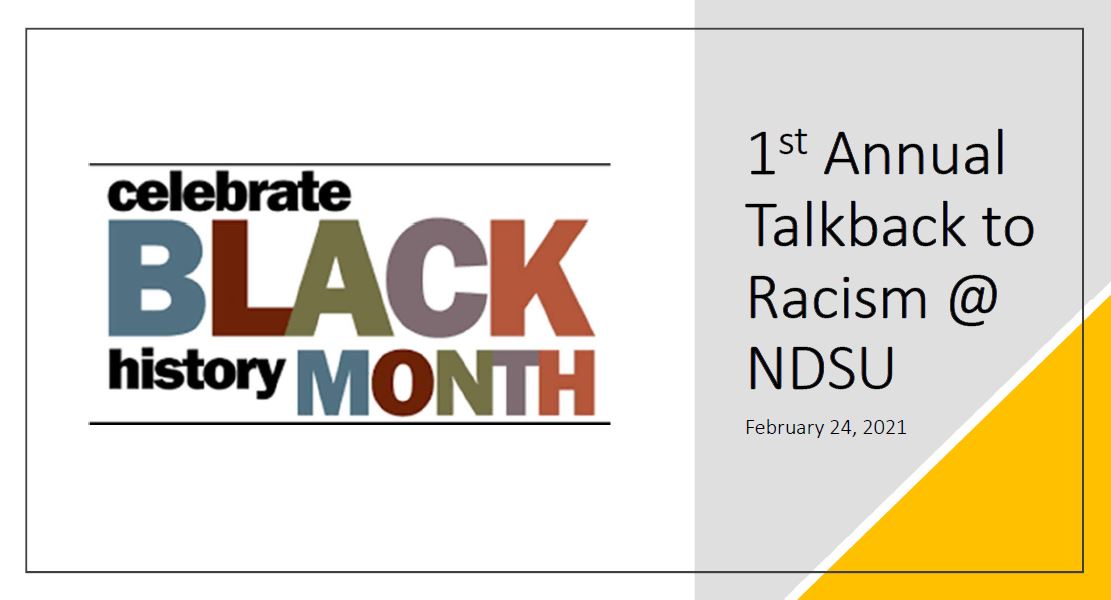
North Dakota State University’s President’s council for diversity, inclusion and respect invites speakers to educate its members on racism in the community.
It’s in history books, the library is lined with its rhetoric, the news still talks about its destruction and after hundreds of years it’s still in existence.
Racism, a word that holds so much pain and violence from the past and present, yet its definition is being acted upon as this article is written. A change starts with educating people about the experiences and true meaning of unity.
North Dakota State University aims to educate its faculty, staff, students and alumni about the importance of diversity and inclusion throughout its campus.
In honor of Black History Month, The President’s council for diversity, inclusion and respect held a virtual TalkBack to Racism for NDSU members on Wednesday.
The event highlighted the importance of diversity and aiding the community in healing from recent incidents of racism through education, awareness and engagement.
Seinquis Leinen, Interim Director of Admissions hosted the session of speakers and presenters from NDSU and areas of North Dakota.
Danny Luecke, an NDSU graduate student of mathematics, kicked off the virtual TalkBack to Racism with the reading of NDSU’s official land acknowledgment and his personal reflection.
His reflection covered three things. First, the emphasis on how land is viewed in the document. “Land is a living relative to be in a relationship with,” Luecke said. “And this is in stark contrast with a western view where land is property.”
Second, the document is written in english. If we are on indigenous land, then English is a foreign language Luecke says.
Third, there is something missing. How did the land get to be this way or how did NDSU get to be on this land?
From a western perspective, the narrative flows as “wilderness to be tamed, land to be claimed from sea to shining sea.” But, from an indigenous perspective it flows as “war, broken land, broken trees, genocide and assimilation.”
“As a land grant institution, I think we need to acknowledge in part how NDSU is here,” Luecke said.
Overall, the message that Luecke displays is that the land we call America is built from the people who it was stolen from and the people who were brought here to unwillingly work on the land.
Speaker Ibtissem Belmihoub, Ph.D. Candidate in Rhetoric, Writing and Culture at NDSU, spoke of personal and community experience in digital storytelling.
Belmihoub says that the main focus of her research is to learn why New Americans want to tell their stories versus why other people want them to tell their stories. New Americans are defined as refugees, asylum seekers, temporary immigrants and permanent immigrants.
She found that New Americans want to tell stories to establish relationships with other people, inspire others who share similar stories and to feel and be heard for the struggles that they went through coming into the country.
“The community stories that I gathered here were really inspiring and could be used for good,” Belmihoub said. “They help define problems within the community without us having to try and guess what they are.”
Dr. Larry Napoleon, Assistant Professor, School of Education, educated the audience with the concept of Black Lives Matter. “People aren’t always talking about the same things,” Napoleon said.
He explained that Black Lives Matter holds three different meanings: the simple statement, the rallying/cry and the organization.
Napoleon says it is important to distinguish which one is being talked about because people might not all be talking about the same thing. When one asks someone if they agree with Black Lives Matter, being clear allows for a more educated conversation.
The murder of 17 year old Trevon Martin in 2012 ignited the flame that is burning ever so strongly today. The Black Lives Matter statement and movement is a direct response to that incident that is a part of a larger historical condition according to Napoleon.
Another thing Napoleon emphasizes is people who are tired of hearing about anything to do with Black Lives Matter.
“It is likely that most of us will tell you that there is no group more tired of talking about this than we are because we talk about it as part of our lived experience,” Napoleon said. “Oh, I guarantee you, if we could wave a magic wand and make conditions that would eliminate the needs for this declaration, we would do it.”
Napoleon discussed that there is often a stigma that people who support and address the problem also hate America. “If you love something, you should want it to be the best version of itself,” Napoleon said.
Student representatives from NDSU’s Multicultural Student Organizations showcased their efforts in promoting diversity and inclusion throughout campus. Poems, short stories and videos were shown to highlight the social and racial injustice that they experience.
High school students across North Dakota also read their award-winning poems and short stories that captured the unfamiliar experiences and emotions that most privileged people in society don’t understand.
To conclude the session, Kwaician, a singer and songwriter who recently performed at last year’s Martin Luther King Celebration in Fargo, sang his single “Life Jacket.”
“I chose this because it brings light to racism,” Kwaician said. “Everyone can feel like they are moving in a good direction and then you get the rug pulled from under you just as easy… we all have that life jacket.”
Dean L. Bresciani ended the session by thanking the 13 presenters and highlighting the creation of a mosaic representing the rich diversity of the NDSU campus that often gets overlooked.
“We took a step in that direction today, not a concluding step, not anywhere where we need to go, but it is a step in the right direction,” Bresciani said.
